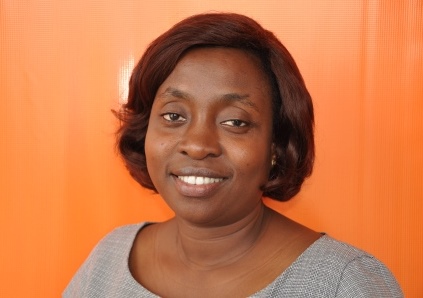
By Valerie Gwinner
Dorcas Olubunmi Ibitoye started her botany studies as an undergraduate student, determined to do well, go far, and find ways to improve the lives of rural people.
“I opted for plant breeding, because I saw the potential for creating improved crop varieties that could increase yields, and boost nutrition and incomes for smallholder farmers,” she says.
Ibitoye obtained a bachelor’s degree in botany from the University of Ilorin and then completed her master’s degree in plant genetics and breeding at the University of Ibadan. Her MSc supervisor introduced her to cowpea (Vigna unguiculata L. Walp.), which became her specialty.
From a plant breeder’s perspective, cowpea is a useful crop to study. It has a short gestation, produces three crop cycles per year, is easy to hybridize, and provides insights into genetic manipulation technology that can be adapted to other plants. Cowpea is also important from an agricultural standpoint. Grown in dry regions and raised by both men and women, it is a major staple crop that can be used fresh, as dry grain or flour, or for its foliage. In Nigeria and other parts of sub-Saharan Africa, cowpea is a key and affordable source of dietary protein. Cowpea tolerates some stress, but it needs water during the flowering and pod-filling stages to have good yields.
“With the unpredictable rainfall associated with climate change, we need varieties that are more drought resistant,” says Ibitoye. “We need climate-smart crops.”
Ibitoye has continued to work on cowpea breeding for her PhD research, which she is pursuing at the West Africa Centre for Crop Improvement at the University of Ghana on a scholarship from the Alliance for a Green Revolution in Africa (AGRA). Through its Program for Africa’s Seed Systems, AGRA is providing farmers with quality, high-yielding seeds by establishing effective breeding and seed systems across the continent, including a focus on staple crops, including cowpea, to alleviate malnutrition.
“We are learning from past green revolution mistakes, which neglected the importance of dietary diversification,” notes Ibitoye. “If all we do is increase the yield of one class of food at the detriment of others, malnutrition is inevitable. Now we recognize the importance of linking agriculture and nutrition to create a greater complement of crops, so that people are better nourished.”
Ibitoye’s research is focused on finding rapid, efficient, and affordable screening methods for identifying drought-resistant traits. She is screening lines of cowpeas exposed to drought and using molecular approaches to fast track the identification of resistant genes. These are crossed with traditional varieties to create varieties that contain other desired traits, such as easy peeling or short cooking times.
Ibitoye’s work includes participatory rural appraisals with men and women farmers to understand their preferences and production constraints. “The focus of our breeding research needs to be farmer-driven from beginning to delivery in order to meet farmers’ needs, ensure early adoption, and push government processes to speed up the release of improved varieties,” says Ibitoye.
Following her PhD, Ibitoye plans to work on tomatoes to develop hybrid varieties adapted to African environments, with an extended shelf life and the ability to resist pests and diseases. She also wants to encourage young people, especially women, to study and appreciate the value of agriculture, plant sciences, and plant breeding.
“Africa needs an agricultural revolution,” says Ibitoye. “And it has to start with improved seeds, bred in Africa for Africa for strong yields, despite various production constraints.”
Ibitoye has high ambitions, which include becoming a renowned plant breeder and rising to put her ideas for restructuring agriculture to work as her country’s Minister of Agriculture. She sees being an AWARD Fellow as both a challenge and chance to maximize the opportunities and build the skills and networks she needs to achieve her career goals.
